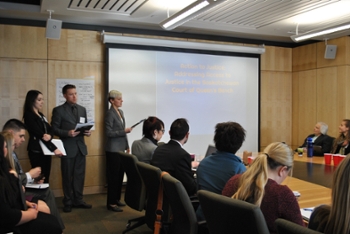
Dean's Forum moves ahead with key recommendations
Since 2013, the Dean’s Forum on Dispute Resolution and Access to Justice has been on a mission to research, consult and discuss solutions to access to justice barriers in Saskatchewan. Now, some of those solutions are becoming one step closer to reality.
By Sarah TrefiakFollowing the last Dean’s Forum in 2015, the Saskatchewan Access to Justice working group and the position of an access to justice co-ordinator were established. Both initiatives were encouraged by the Dean’s Forum participants and Justice Thomas Cromwell in the National Action Committee Report on Access to Justice in Civil and Family Matters (2013).
Brea Lowenberger was hired as the access to justice co-ordinator for the Saskatchewan Access to Justice working group on Oct. 1, 2015, with support from the Law Foundation of Saskatchewan and the College of Law. Since that time, she has been supporting the creation of the working group and the implementation of and evolution of Dean’s Forum topics. She has also spent considerable time connecting with justice community stakeholders, students and faculty, and the community at large on initiatives that promote justice reform and access to justice.
“It is exciting to start to bring this position and the working group ‘to life,’” Lowenberger said. “It is a privilege to collaborate with the various stakeholders, and to now be called upon by stakeholders to assist with implementing new initiatives, which will help reduce barriers to access to justice for Saskatchewan residents.”
When Lowenberger reflects on the amount of work she has done so far, and the incredible amount of work there is to do, she is encouraged by the collaborative approach and commitment of stakeholders to the topic, indicating “the structure that has been built with the Dean’s Forum is commended and admired by other jurisdictions, and we have a real opportunity to continue to be champions of change in Saskatchewan.”
The working group consists of a broad range of approximately 20 individuals, including participants from the public, government, the bench, the bar, academia, the legal profession and related service providers interested in furthering access to justice initiatives in Saskatchewan. Their first meeting was held on Jan. 5, 2016 and they plan to meet twice per year.
While the working group and access to justice co-ordinator position were being created, students at the College of Law were also carrying out research through Professor Sarah Buhler’s access to justice seminar and intensive clinical law seminar classes.
Together, each of these projects created a strong platform for the most recent (and fourth annual) meeting of the Dean’s Forum on Dispute Resolution and Access to Justice held at the College of Law on Feb. 29, 2016.
The day began with students enrolled in the Dean’s Forum course presenting their research findings to the forum, which included more than two dozen justice system stakeholders from across the province. In the afternoon, participants broke out in smaller groups to engage in an in-depth discussion on the topics presented.
Two major themes emerged from the day’s discussions. First, the forum participants recognized and embraced the idea of “Putting the Public First” through innovative and creative practices. There was great interest in ongoing research in this area that might focus on developing a provincial strategy for public engagement with the justice system based on existing best practices. The importance of services and programming that are accessible and consider the needs of the public, reciprocal learning, increased data collection, and the need for reconciliation between the justice system and Aboriginal communities, were also recognized.
The second theme emerging from the day was “Addressing Access to Justice in the Saskatchewan Court of Queen’s Bench.” Participants discussed the possibility of earlier and more active judicial intervention, further engaging lawyers in utilizing the simplified rules of court, streamlining matters early in the court process through triage or otherwise, and ways of gathering statistical data about matters in the Court of Queen’s Bench.
Throughout the day, participants expressed overwhelming support for endeavours aimed at collecting and analyzing data about current access to justice practices, as well as measuring the success of future initiatives.
“There is so much work yet to be done” said Beth Bilson, interim dean of the College of Law. “While the creation of the access to justice co-ordinator position has given the forum a tremendous boost, the creation of an access to justice research centre is the next step.”
And that next step is closer to becoming reality.
Lowenberger has supported the development of a centre steering committee at the College of Law whose members are collectively putting together a proposal for an access to justice research centre that would be housed at the College of Law and be used as a neutral site to gather and analyze data that could help in implementing further access to justice initiatives.
The College of Law is considering various options for funding the creation of the centre and the proposal for the centre still needs to be presented to a number of committees, including University Council, but if approved, it would provide a unique opportunity to continue the work of the Dean’s Forum through concentrated faculty and graduate student research efforts.
This story originally appeared in the Spring 2016 edition of of NOTE.
